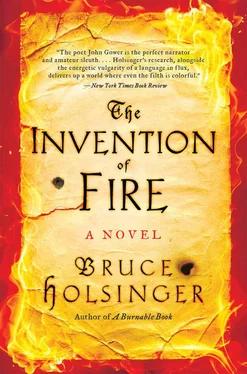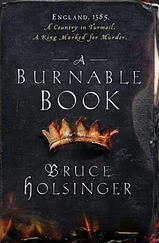Bruce Holsinger - The Invention of Fire
Здесь есть возможность читать онлайн «Bruce Holsinger - The Invention of Fire» — ознакомительный отрывок электронной книги совершенно бесплатно, а после прочтения отрывка купить полную версию. В некоторых случаях можно слушать аудио, скачать через торрент в формате fb2 и присутствует краткое содержание. Год выпуска: 2015, Издательство: HarperCollins, Жанр: Исторический детектив, на английском языке. Описание произведения, (предисловие) а так же отзывы посетителей доступны на портале библиотеки ЛибКат.
- Название:The Invention of Fire
- Автор:
- Издательство:HarperCollins
- Жанр:
- Год:2015
- ISBN:нет данных
- Рейтинг книги:3 / 5. Голосов: 1
-
Избранное:Добавить в избранное
- Отзывы:
-
Ваша оценка:
- 60
- 1
- 2
- 3
- 4
- 5
The Invention of Fire: краткое содержание, описание и аннотация
Предлагаем к чтению аннотацию, описание, краткое содержание или предисловие (зависит от того, что написал сам автор книги «The Invention of Fire»). Если вы не нашли необходимую информацию о книге — напишите в комментариях, мы постараемся отыскать её.
The Invention of Fire — читать онлайн ознакомительный отрывок
Ниже представлен текст книги, разбитый по страницам. Система сохранения места последней прочитанной страницы, позволяет с удобством читать онлайн бесплатно книгу «The Invention of Fire», без необходимости каждый раз заново искать на чём Вы остановились. Поставьте закладку, и сможете в любой момент перейти на страницу, на которой закончили чтение.
Интервал:
Закладка:
A city divided against itself, a realm churning with eternal crisis: rich bulges of opportunity for a man who does what I do. Yet London was growing increasingly strange to me, as if our ages and habits, flowing as one for so many years, were slowly parting around a rising isle in the stream. Looking back on that autumn, I liken my own sense of things to the steadily deteriorating condition of my eyes. On a bad day, when I looked at a line of trees, I would perceive it as a fluctuating plane, wobbling blurs of light and dark. If in the light I saw the promise of knowledge and resolution, the dark yielded a flat nothingness, or a foreign and shapeless world.
Chapter 6
"Mar-Elizabeth? Now, Elizabeth?”
The woman sighed. She could almost smell his dread, hear it in his tentative voice. Fear repulsed her. “Yes, Antony. Now.”
The false name came easily to her, and it seemed to give him some measure of confidence. He stood slowly, brushed at his too-tight doublet with those giant hands, and went to see the keeper in the front room. She heard the soft tink of coins, a satisfied “Very well, good sir,” from the keeper’s wife, then he reappeared in the low doorway.
She looked at his feet. Stop shuffling, said her frown. He lifted them, straightened that laborer’s spine. She gave him an approving smile as he sat.
“And the horses?” she said, tightening her plait and tucking it back in place beneath her hood. A strand still teased her cheek. She pushed it to and caught him watching her. She felt herself blush.
He nodded stiffly, oblivious to her discomfort, his own neck reddened from the restriction of the high collar. “A few moments. ’Nother company’s just arrived, so stablers’re quite busy at the moment.”
She stifled another sigh. Much work to accomplish here, though the long journey north to Durham would give them plenteous time. St. Cuthbert’s bones were hardly planning to get up and walk away.
She coughed into a balled hand. The back chamber was stuffy, close, full of smoke. Gentlefolks’ room, the keeper proudly called it, though she had stolen more than one envious look at the airy common hall up front, where a dozen or so lower travelers in their company, man and woman alike, relaxed and drank from the inn’s stock of dark, river-cooled ale. She sipped at warm wine, washing down the pigeon pies and greens, wondering if she would ever truly satisfy her hunger after such long privation. She closed her eyes, felt herself shudder in the stiff chair, let the images take her for a moment, as they daily would do. The filth, the fire, the smoke and death. A clearing in the woods, the strange crack of the guns.
When she looked up she saw him staring down at his food. She was happy to see him eating slowly, as she had instructed, but as she watched his bearded jaw work at the supper, other considerations afflicted her. Where would their next meal come from? Should they stay the night here, with this new company of pilgrims, or push on along toward the next town, trusting their luck to find another inn before nightfall? On this main road, just three days north of London, there should be many choices. Yet not any inn would do, not for a couple in their situation. They- she -had to choose carefully, with a mind to appearances. The appearance of appearances.
She was preparing to push her chair out and find the privy when a clamor sounded from out front. Calls from the yardboys, loud neighs from a struggling horse. Another few shouts, then the inn’s street door slammed open. Their view from the back was blocked by a half wall, but they could hear men’s businesslike voices from up front.
She grasped his arm, fixed him with a stare. Was it over already? “Steady now, Antony.”
“Aye,” he said, barely a whisper. He placed a hand on hers. She didn’t flinch at his touch, as she had at first. I am your wife, she silently assured him, and herself.
The alewife appeared in the doorway. “A nuncius, from down Westminster,” she said, a finger aside her nose. She bent slightly toward them. “They pull in here, smelling like a wet dog, demanding our best, but then they’re always off eft soon. We’ll have him off your ear quicker’n a pig eats a corn.”
Her shoulders tightened as the alewife left, and her gut flipped. A royal messenger. Westminster, London, soldiers, and she saw it all again, heard and smelled the death.
In the front room the nuncius exchanged low words with the keeper, who sounded concerned, though about what she could not discern. She heard the muffled slap of a purse changing hands. The keeper approached their table, his face showing distaste.
“With your pardon, mistress, and yours, gentle sir, this king’s man would like a word,” he said. He ducked out, visibly relieved his part of the business was done. The messenger replaced him in the doorway. A short, hard man, his skin swarthy with the sun. There was a scar beneath his chin, a thin line of whitened flesh that disappeared into a loose shirt of dun wool, stained and flattened by the narrow saddlebags flung over his shoulders. These were affixed with the badge of King Richard, the white hart on a field of faded blue. His eyes, deep set and impassive, swept past her own as he turned to the man across from her.
Yes, we are done, she thought, her pulse a low throb in her ears. The nuncius started to speak. “Good sir, if you will-”
“What is the meaning of this intrusion?”
“Antony!” she said, pressing his arm, though instantly regretting it. He had done well to question the messenger, to demand an explanation in that gentleman’s tone.
The nuncius loomed over their table in the small chamber. “My horse has gone lame,” he said flatly. “A mile south of here.”
“Oh?” she said, taking on the same superior tone. “And what of it?”
“The gentleman here-his is the best horse in the stable.”
“Not the least surprised,” said the horse’s rider with a proud nod. “Strong fellow, isn’t he?”
“I will be commandeering him,” said the nuncius, no hesitation or apology in his tone. “I have a full day’s ride to the next post, and the need for a swift mount.”
She felt her chest loosen. “There are no other horses suitable to your needs?”
He looked aside. “Others suitable? I would think so. But speedy, strong? No, mistress. And I’ve patents in my pouch that need handing off.” He fingered the leather bags yoking his chest and shoulders. “I’ll take your horse now.”
“If you must.” She nodded tightly. “We will be compensated?”
“Aye, and most generously.” He opened his palm. On it sat ten-no, twelve nobles. A decent sum for a pressed horse, though the stallion would easily fetch fifteen at one of the larger markets. But she saw no need to quibble, and draw more attention.
She looked across the table. Take them, Antony. But he sat there like a lump, his mouth half open, his gaze wide and fixed on the coins. Beneath the table she pressed his foot with her own, then watched as he closed his mouth and gave the nuncius a curt nod. He held out a hand, and the royal messenger let the nobles slip from his palm. Probably a greater sum than Robert Faulk has ever held, she mused.
“Will that be all?” she asked the messenger, feeling incautious.
“It will. And the king’s thanks.” King Richard’s messenger turned on his heel, leaving the inn by the yard door.
The keeper reappeared. “Apologies, good gentles.” He rubbed his palms. “No choice, really, not when it comes to one of those Westminster riders.”
She tried to mask her worry. “You have a replacement you will sell us?”
“I do indeed, mistress. Fine mare. Chestnut, four years, broke her myself. Name’s Nellie.”
Читать дальшеИнтервал:
Закладка:
Похожие книги на «The Invention of Fire»
Представляем Вашему вниманию похожие книги на «The Invention of Fire» списком для выбора. Мы отобрали схожую по названию и смыслу литературу в надежде предоставить читателям больше вариантов отыскать новые, интересные, ещё непрочитанные произведения.
Обсуждение, отзывы о книге «The Invention of Fire» и просто собственные мнения читателей. Оставьте ваши комментарии, напишите, что Вы думаете о произведении, его смысле или главных героях. Укажите что конкретно понравилось, а что нет, и почему Вы так считаете.












